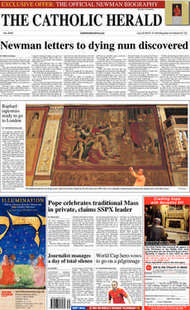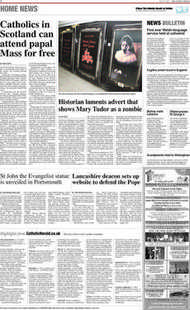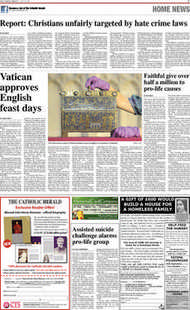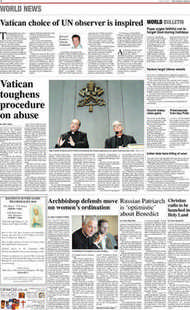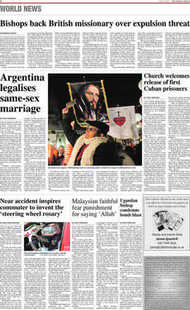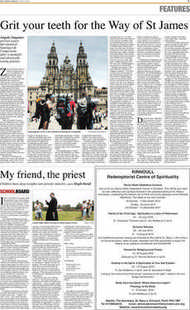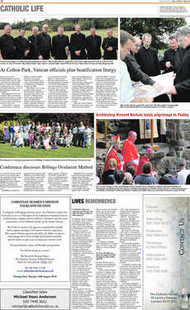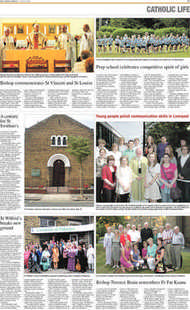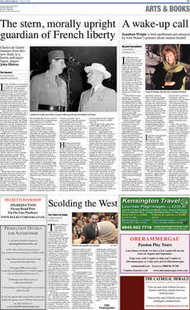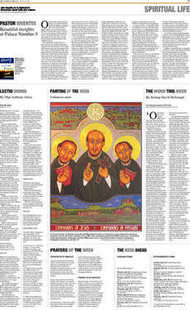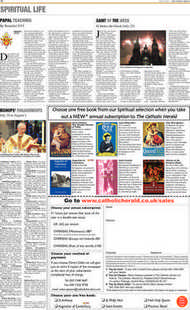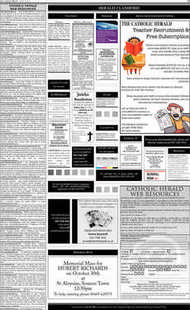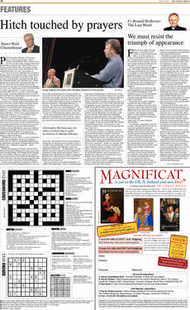Page 20, 23rd July 2010
Page 20
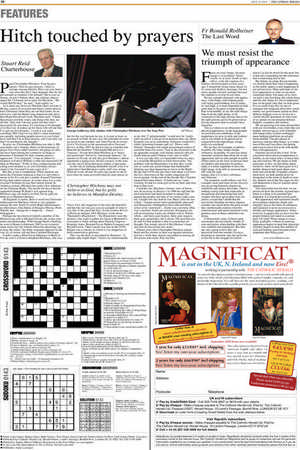
Report an error
Noticed an error on this page?If you've noticed an error in this article please click here to report it.
Tags
Share
Related articles
Hitch And His Friends
‘it’s Bolshevism For The Home Counties’
The King Who ‘did God’
Stuart Reid Charterhouse
Why Does God Make Britons So Furious?
Dr Saunders To Be Given Award
Hitch touched by prayers
Stuart Reid Charterhouse
Poor Christopher Hitchens. First he gets cancer. Then he gets prayers. There is outrage among atheists. How can you treat a sick man like this? they demand. Has he not got enough to contend with already? Have you no shame, no pity? Johann Hari, the militant atheist, urged the Twitterati not to pray for Hitchens. “He would HATE that,” he said. “And rightly so.” As it turns out, however, Hitchens does not hate it. He has a sense of occasion and knows better than to kick Christians when they are on their knees. In an interview with the Right-wing American talk show host Hugh Hewitt last week, Hitchens said: “I think that prayer and holy water, and things like that, are all fine. They don’t do any good, but they don’t necessarily do any harm. It’s touching to be thought of in that way. It makes up for those who tell me that I’ve got my just desserts... I wish it was more consoling. But I have to say there’s some extremely nice people, including people known to you [who] have said that I’m in their prayers, and I can only say that I’m touched by the thought.” So pray on. Christopher Hitchens can take it. His soul mates can’t, though. Many of the promises of prayer have been rather tentative, but gangs of atheists have been hitting the comboxes of blogs to denounce Christians for their smarmy passive aggression. “I’m sickened,” wrote an atheist in response to Francis Phillips’s mild and measured CH blog on Hitchens. “If this is how compassionate and caring your religion is, as you Christians always claim to be, I’m glad I’m not a part of it.” But this is not a competition. What interests me about the Christian response is that it is not what it seems to be. It is not just a matter of good Christians loving their atheist enemy. In some cases it is a case of good Christians loving their atheist friend. In America, at least, Hitchens has quite a few admirers on the Christian Right. The reason for this is that he supported George W Bush’s war against Iraq. Hitchens may not believe in God, but by golly he believes in Manifest Destiny.
(In England, it seems, there is much less Christian enthusiasm for Hitchens, but he is very popular among the new breed of centre-Right atheist/agnostic libertarians. One thinks of Douglas Murray, Peter Whittle and – though he is Anglican – James Delingpole.) Perhaps the best-known Catholic member of the Hitchens fan club is Michael Novak, the writer, journalist and philosopher. With George Bush’s backing, he went to Rome in February 2003 to try to knock some sense into the Vatican about the upcoming war in Iraq. He failed. The Pope remained opposed to the war, as, of course, did the then Cardinal Ratzinger.
It didn’t make a blind bit of difference to Bush or Novak, and it will have delighted Hitchens, who was hot for the war because he saw it, in part at least, as an assault on God. In any case old comrades-in-arms are loyal to one another, and when Novak reviewed God is Not Great in the neoconservative National Review in May 2007 he did not turn in a hatchet job. Beneath the headline “Christopher Hitchens is a Treasure”, Novak described Hitchens as a “brave and good man” driven by “passionate honesty”. In fairness to Novak, he did also give Hitchens’s atheist arguments a going-over, but his courtesy to the man was the sort of thing that gives charity a bad name.
At the risk of seeming charitable myself, I have to admit that I find Hitchens’s early stuff very strong. What he wrote 20 and 30 years ago seems to me to have been far more powerful than his later pieces in Vanity Fair, the magazine of the rich, the beautiful and the hip. Let me give you an example of what it was like in the good old days. In the London Review of Books in January 1991 Hitchens wrote about “Bertorelli’s Blackshirts”. The Blackshirts were the thinkers who used to gather for lunch at Bertorelli’s restaurant in Soho, among them Patrick Cosgrave, Kingsley Amis, Bernard Levin, Robert Conquest and Russell Lewis. Their conceit was that in the 1970s Britain was a country in which it was dangerous to hold conservative opinions.
This was the drill, as described by Hitchens: “A sample sally might begin: ‘I know its unfashionable to say this’ [“unfashionable” would now be “politically incorrect”] and go on to propose that, say, Hans Eysenck was on to something. Someone would lift a riskily brimming bumper and cry: ‘Down with Oxfam!’ Someone else might recommend a piece of samizdat from Encounter. And so the afternoon wore on agreeably enough, with daring satirical calls for South African port, Chilean wine, and so forth.” It was just like that, as I remember from my days as a wannabe Blackshirt in Fleet Street pubs. The problem with the Blackshirts was that they would not, or could not, acknowledge that fashionable thinking was then beginning to move to the Right. By the mid-1970s the Spectator had taken over from the New Statesman as the weekly magazine for clever people. At the end of the decade Mrs Thatcher entered Downing Street. “Conservatives” were winning. It took no more guts to be on their side then than it does now.
Consider, too, Hitchens’s former view of terrorism. In an essay in Harper’s in 1986 he said that the term terrorism had been invented to spread fear among the people, and that, if we weren’t jolly careful, it might one day lead to war. Here’s how he saw it then: “A great power and a purportedly educated and democratic intelligentsia have allowed themselves to be ‘terrorised’... Stalin was a terrorist, Mao was a terrorist, Arabs are terrorists; Europeans are soft on terrorism; Latins are riddled with it. Whisk, whisk... and there goes history, there goes inquiry, there goes proportion. All is terror. The best that can be said for this method is that it economises on thought. You simply unveil it like Medusa’s head and turn all discussion into stone.” Fifteen years later Christopher Hitchens joined Bush and his cronies in their war against terrorism and for a while they almost succeeded in turning all discussion into stone. Pray for him.
blog comments powered by Disqus


